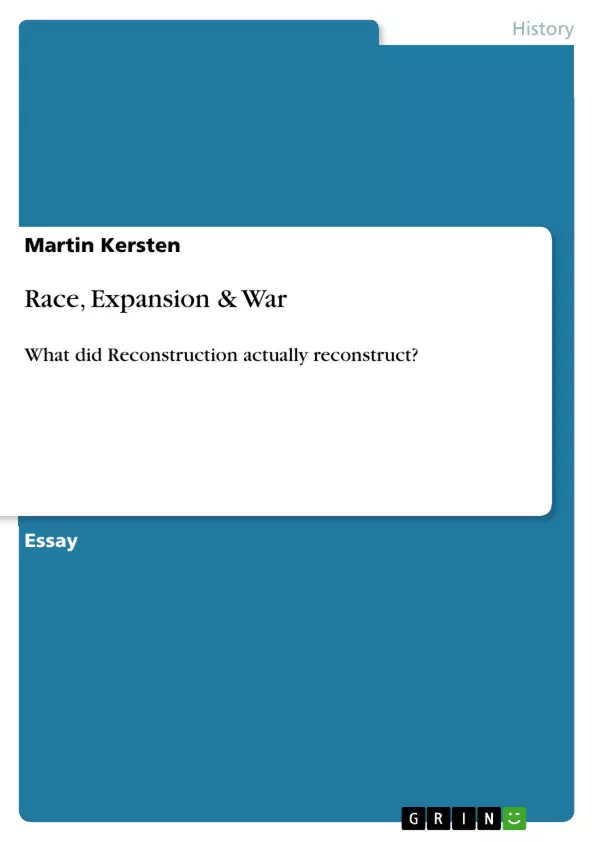With the formal end of slavery a new phase of the American history began – the so called era of Reconstruction. This period led to radical changes for the black community. In this essay I will try to outline that Reconstruction in the end did neither ‘reconstructed’ nor ‘constructed’ a better life, respectively democracy and freedom, for black Americans in the South. In order to do so I will work with examples from the Caribbean Islands like Haiti and Jamaica, where slavery was abolished only some years before, to give a better understanding of the situation in the United States.
Inhaltsverzeichnis (Table of Contents)
- Introduction
- The Civil War and Reconstruction
- The Caribbean Islands as a Model
- Black Codes and the Struggle for Control
- The Reconstruction Era and its Challenges
- The Rise of Redemption and the Return to Discrimination
Zielsetzung und Themenschwerpunkte (Objectives and Key Themes)
This essay aims to analyze the impact of Reconstruction on the lives of Black Americans in the South, arguing that it ultimately failed to reconstruct a better life for them, particularly in terms of achieving genuine democracy and freedom. The essay draws parallels with similar experiences in the Caribbean Islands to provide a broader context for understanding the complexities of emancipation and post-slavery society. Key themes explored in the essay include:- The failure of Reconstruction to achieve lasting equality for Black Americans
- The role of political power and economic systems in perpetuating racial inequality
- The impact of Black Codes and other forms of discrimination on Black communities
- The significance of the Caribbean experience in understanding the challenges of emancipation
- The enduring legacy of racial discrimination in the South
Zusammenfassung der Kapitel (Chapter Summaries)
The essay begins by outlining the radical changes brought about by Reconstruction, highlighting the goal of achieving voting rights for Black people. It then examines the influence of the Caribbean experience on the Reconstruction debate, particularly the questions surrounding property, labor control, political participation, and the exclusion of Black people from power. The essay then delves into the implementation of sharecropping in the South, arguing that while it provided Black people with a choice, it ultimately perpetuated their economic dependence on white planters. It further explores the failed attempts of Southern states to attract European immigrants to break the negotiating power of Black laborers, ultimately resorting to the use of Black Codes to control their labor. The essay concludes by examining the legacy of Reconstruction, highlighting the rise of Redemption and the subsequent resurgence of racial discrimination. It emphasizes the failure of land reform and the resulting wave of Black migration to Northern cities, ultimately concluding that Reconstruction did not achieve its intended goals of establishing lasting equality and freedom for Black Americans.Schlüsselwörter (Keywords)
Reconstruction, Black Americans, slavery, emancipation, civil rights, Black Codes, sharecropping, Caribbean Islands, Redemption, racial discrimination, political power, economic inequality, land reform, migration.Frequently Asked Questions
What was the main goal of the Reconstruction era?
Reconstruction aimed to reorganize the Southern United States after the Civil War, focusing on achieving voting rights and freedom for the formerly enslaved Black community.
Why does the essay argue that Reconstruction failed?
The essay argues that it failed to establish genuine democracy or lasting equality, as economic dependence and new forms of discrimination emerged shortly after.
What were the "Black Codes"?
Black Codes were restrictive laws designed to limit the freedom of Black Americans and compel them to work in a labor economy based on low wages or debt.
How did sharecropping affect formerly enslaved people?
While it offered a degree of autonomy, sharecropping often resulted in a cycle of debt and economic dependence on white landowners, mimicking many aspects of slavery.
What is the significance of the Caribbean model in this study?
The essay uses examples from Haiti and Jamaica to show that the challenges of emancipation and labor control were part of a broader regional struggle in post-slavery societies.
- Quote paper
- Martin Kersten (Author), 2011, Race, Expansion & War, Munich, GRIN Verlag, https://www.hausarbeiten.de/document/164990


